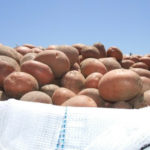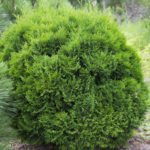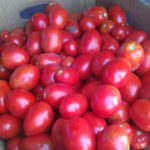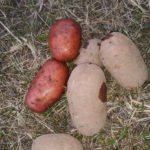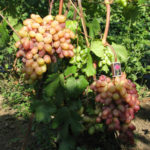Yanka potato variety
Yanka is a Belarusian table potato variety (Solanum tuberosum) of medium ripening. Bred by the specialists of RUE "Scientific and Production Center of the National Academy of Sciences of Belarus for Potato and Fruit and Vegetable Growing". In 2012 he was included in the state register of breeding achievements of the Russian Federation. Approved for cultivation in two regions of the country: Northwest and Central. It is successfully grown in other regions of Russia. Differs in large tubers, high yield and resistance to many diseases. Suitable for growing both in garden plots and in large areas on an industrial scale. Suitable for mechanical cleaning.
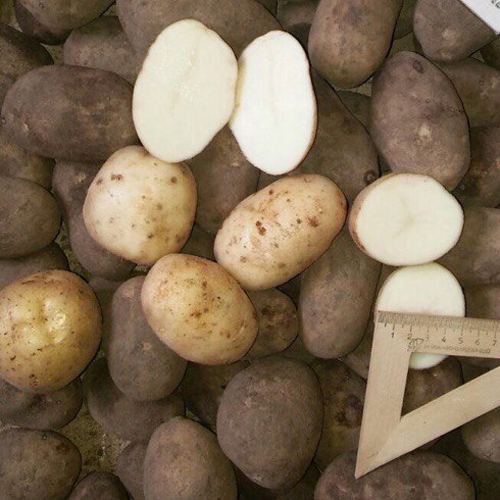
The period from the emergence of full shoots to harvest is 90-100 days.
Plant of medium height, leaf type, moderately spreading. The main stem is semi-erect. Leaves of medium size, open type, light green in color, slight waviness is noticeable along the edges of the leaf blade. Corollas are medium-sized, white, the intensity of anthocyanin coloration on the inner side is very weak or absent. Potatoes practically do not have berries.
In one nest, 8-12 large uniform tubers are formed with an average weight of about 81-106 grams. They have an oval shape, a flat surface without bumps. The peel is weakly reticulate, strong, yellow in color. The flesh on the cut is white or light cream in color. The eyes are small, uncolored, the depth of occurrence is average.
The marketable yield of the Yanka variety, according to the results of state tests, was recorded in the range of 195-311 c / ha, at the level of standards Lugovskoy, Aurora... The largest amount was harvested in the Kostroma region - 360 c / ha, 80 c / ha more results Scarb... According to some reports, the yield indicator can reach up to 600 c / ha, but there is no confirmation of such results in official sources. The marketability of tubers is high - 85−95%, keeping quality is excellent - 96%.
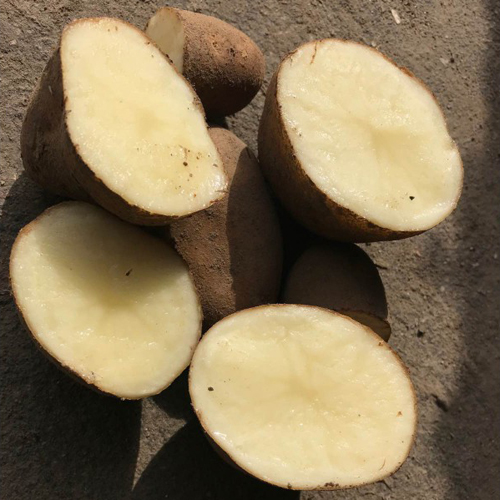
The taste is very good, and according to reviews, even great! The tubers are characterized by medium digestibility and are versatile in cooking. The pulp is moderately crumbly, pleasant consistency, not watery and not dryish. After heat treatment, the tubers do not darken and do not lose their shape, so they look very attractive when finished. These potatoes are great for frying, including deep-fried, boiling, stuffing, baking, and will be an excellent addition to soups and salads. The variety is also good for making mashed potatoes, but it turns out it is not airy, "for an amateur". It is also suitable for industrial processing into chips, frozen semi-finished products and freeze-dried puree. The starch content in tubers is about 12.2-17.6%.
Yanka perfectly adapts to any soil and climatic conditions. However, the originator recommends growing it on light and medium-sized soils. Simply put, on sandy loam and light loam. But this does not mean that on other types of soils, the yield will be noticeably lower, it depends largely on agricultural technology. The variety very actively uses the nutrients and minerals of the soil, therefore, in most cases, it needs to apply increased doses of fertilizers, in particular mineral fertilizers. Below are some other features of cultivation and care.
- Before planting, it is necessary to select and calibrate the seed. Small specimens without mechanical damage and signs of disease are best suited. Due to the high resistance of this variety to many diseases, it is not necessary to pickle the tubers. But treatment with growth stimulants can be beneficial.
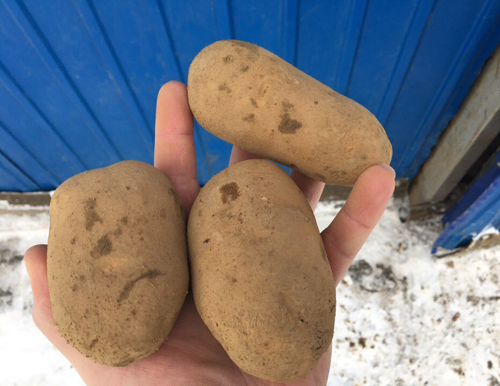
- Planting is carried out in early to mid-May, when the soil warms up to + 8-10 ° C and the danger of frost has finally passed.
- The variety originator provides recommendations for planting density. For cultivation in order to obtain marketable products, 45-48 thousand tubers are planted per hectare of area, and in order to obtain seed material, 52-55 thousand tubers per hectare should be planted.
- As already mentioned, plants are very responsive to feeding. Mineral complexes should not be spared, but it is better to be on your guard with nitrogen complexes - a large number of them leads to activation of the growth of tops to the detriment of tubers.
- As for watering potatoes, this event should be carried out as needed. Do not allow the soil to dry out or waterlogged, this will painfully affect the plants. In northern latitudes, for example, watering may not be required at all.
- Also, do not forget about the standard agricultural practices, they can greatly affect the yield. These include the timely loosening of the soil, weeding, hilling, as well as the treatment of plantings with insecticides. According to gardeners, Yanku is very fond of the Colorado potato beetle, so preventive measures should not be neglected.
- Maintain crop rotation in your area. This is very important, even though our hero is resistant to many nightshade diseases. The most beneficial predecessors are legumes, onions, cucumbers, cabbage, garlic, beets, green manure.
- Update your seed in a timely manner. Thanks to this event, your harvest will always remain at the proper level, the tubers will not shrink and lose their presentation.
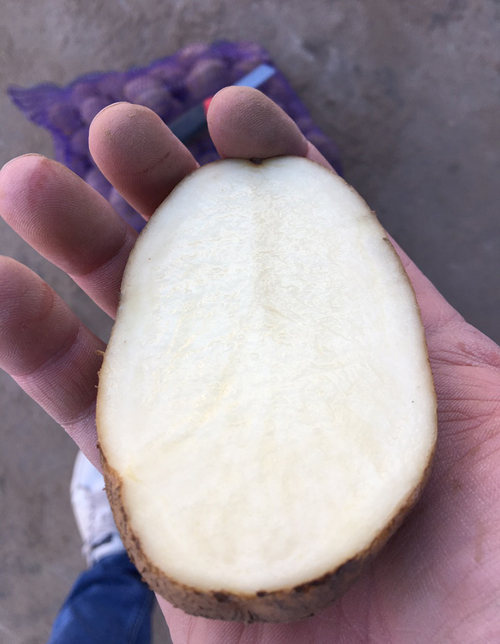
The variety is highly resistant to golden cyst nematode, cancer causative agent, wrinkled and banded mosaic, leaf-rolling virus. Shows medium resistance to common scab, black leg, Alternaria, dry fusarium rot, anthracnose, late blight of tubers and tops.
In a relatively short period of existence, Yanka managed to win the trust of gardeners in many parts of Russia and Belarus. It is especially appreciated for its high yield, excellent presentation of tubers and their delicious taste, resistance to diseases, unpretentious care and the ability to adapt to any growing conditions. Also note its excellent keeping quality: potatoes can be stored for more than a year without loss of consumer qualities and pleasant appearance. Another advantage is resistance to mechanical damage, so that harvesting can be done by machine.
Among the shortcomings, mention should be made of the exactingness to the mineral composition of the soil. To obtain high yields, you will have to take care of providing plants with fertilizers. It is also necessary to say that our hero, although he has a wide distribution area, is rather poorly zoned in some regions, for example, the Ural, Siberian
In a short time, Yanka gained quite a lot of popularity in the wide potato market, showing itself excellently both during state tests in experimental areas and in amateur cultivation on personal backyard plots. Our hero is distinguished by reliability and stability, which is far from always possible to say about many other varieties on the market.
